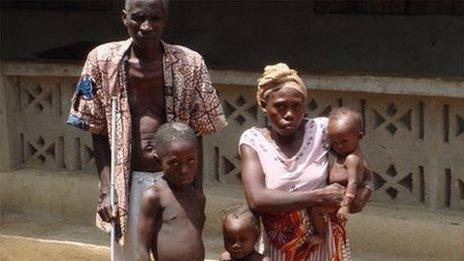Immunisation in Sierra Leone - pneumonia and diarrhoea
- Published
- comments

Jayah and Mamie Nyally and their children. Emma is in her mother's arms
What does the future hold for Emma and her siblings?
That is the question that I kept asking myself. Emma is eight months old and was one of many babies being cradled by their mothers at the Gondama community health centre. It's a rural area about four hours drive from the capital Freetown.
Like many of the babies, Emma was there to be immunised - against polio with two drops of vaccine into the mouth and against pneumoccocal disease, the main cause of severe pneumonia.
River blindness
Mamie Nyally, Emma's mum, agreed that we could film them in their village. Emma has a three-year-old sister and a brother who is six or seven, they were not sure how old.
Mamie's husband Jayah used to be a diamond digger but he got river blindness and has been unable to see for more than 20 years.
River blindness is still a serious problem in many parts of Africa.
It's an infection caused by a parasitical worm which is spread by the bites of blackflies which breed in fast-flowing water. There are active programmes to halt the disease.
Free healthcare
Under the shade of a mango tree Mamie and Jayah told me that four of their seven children had died: two from pneumonia, one from diarrhoeal disease and the fourth in a fire.
The family appeared to have no real income. They grew and traded some vegetables, collected and sold firewood and that was it. There are no state handouts.
So the introduction of free healthcare is of huge significance. In April 2010 heallthcare was made free for pregnant women, breastfeeding mothers and children under five.
"I am very grateful there is free healthcare," said Mamie Nyally. "I don't want to lose another child."
Rotavirus vaccine
For a country that is still recovering from war, it was a bold gesture by the government of Sierra Leone.
It has been achieved through massive support from aid agencies, the UN and the UK government. Last year the UK gave £45m in direct aid.
With us on the trip was David Ferreira, the head of innovative finance at GAVI, the Global Alliance for Vaccines and Immunisation. He explained that GAVI hopes to introduce a vaccine against rotavirus, the main cause of severe diarrhoea. The vaccine is given orally, in the form of drops, just like polio immunisation.
Four million children
But the roll-out of the rotavirus and pneumoccocal vaccines is dependent on funding. That's where the pledging meeting on Monday in London comes in. Donor nations will be asked to promise an extra £2.3bn for immunisation between now and 2015.
These are times of austerity, but unicef, the World Health Organisation, the Gates Foundation, Save the Children and many other organisations are all lobbying hard to secure the funding. They argue it could help save the lives of an extra four million children by 2015.
If the funding target is achieved the the rotavirus vaccine could begin being used in Sierra Leone as early as next year. Together with the pneumonia jab it should save many lives.
Tomorrow I visit the children's hospital in Freetown.
The BBC's medical correspondent, Fergus Walsh, talks to David Ferriera, from the Global Alliance for Vaccine and Immunisation: "1.7million children die every year from vaccine preventable diseases"